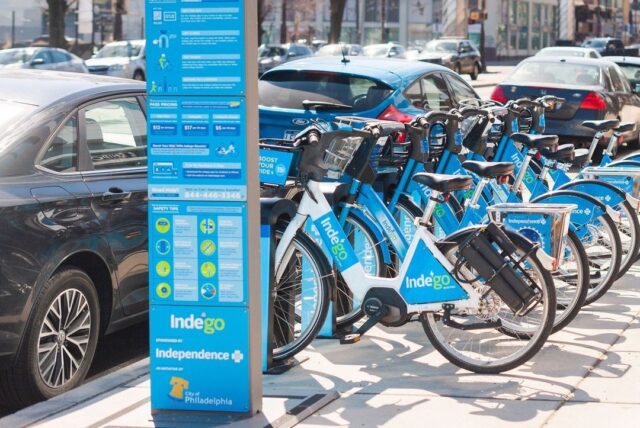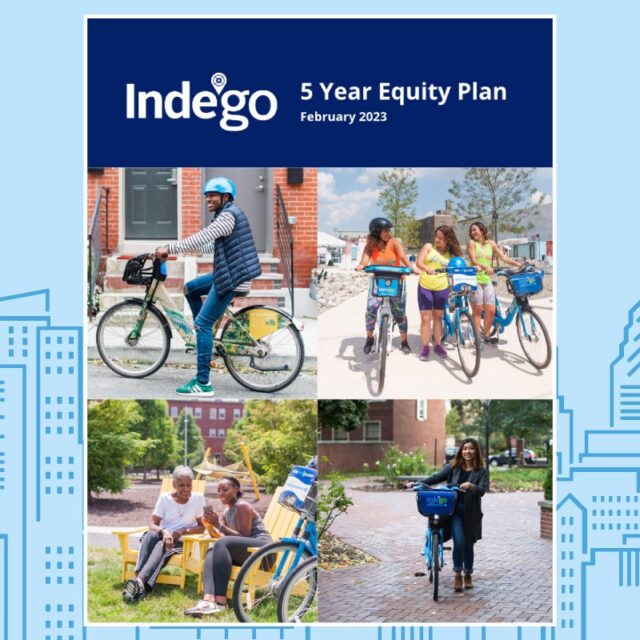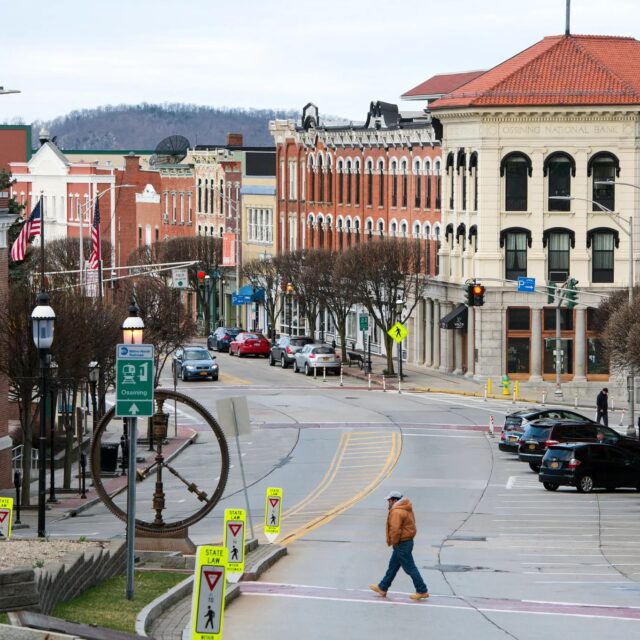The Equity Implications of Electric Bike Share
by Kiran Herbert, Communications Manager
March 22, 2023
In Philadelphia and elsewhere, shared e-bikes have brought more people — and especially low-income, riders of color — to bicycling.

Since it first launched in April 2015, Indego, Philadelphia’s bike share system, has done things differently. At the time, bike share was primarily relegated to more affluent neighborhoods and users, despite its potential for helping alleviate transportation insecurity amongst more low-income populations. In an effort to serve historically underserved communities, the City of Philadelphia launched Indego with stations in target neighborhoods, a discounted pass program, and a comprehensive outreach plan. Today, Indego remains committed to equity as it continues to expand its system and incorporate electric bicycles into its fleet.
In a study published last year, Rutgers University researcher Or Caspi examined how the integration of e-bikes influenced Indego’s usage in historically disadvantaged areas. By combining publicly available data with spatial analysis methods, Caspi found that the introduction of e-bikes not only increased the overall usage of Indego but had a pronounced effect in historically underserved areas. The research concludes that e-bikes were successful in promoting bike share in disadvantaged areas.
“E-Bikes have been a great addition to the Indego fleet giving riders the opportunity to take longer trips with less effort,” says Waffiyah Murray, Indego program manager at the City of Philadelphia. “E-bikes help address barriers such as distance and physical effort to open the door for new cyclists who may not have considered using Indego before. Our Indego Access program also helps eligible pass holders use e-bikes at a discount rate.”
What’s more, Caspi’s research showed that riders in historically underserved areas — those most likely to take advantage of Indego’s Access program — were mostly using bike share for leisure and other utilitarian purposes, as well as for commuting. Folks in the rest of the city, however, were primarily using bike share to commute. This aligns with anecdotes Murray has heard from riders of color, who aren’t ready to necessarily commute back and forth from work but are interested in getting in some additional physical activity with family and friends.
These findings also jive with two other 2022 studies that were based on Indego ridership. The first study found that, for people of color, recreation is a bigger motivator to use bike share than utility, while the second study found that bike share had the potential to activate inactive adults.
Despite being less taxing to ride thanks to a battery-assisted motor, e-bikes still offer a slew of health benefits, especially for those who might not otherwise bike. For people that may have felt like bicycling was just for “the white guy in lycra,” e-bikes — which accommodate most outfits and fitness levels — offer an alternative that is fun to ride and doesn’t come weighed down with stereotypes. By offering a low-income pass and doing extensive community outreach with trusted neighborhood partners, Indego is further helping break down barriers to e-bike use.
“People with reduced fare passes in Philly ride e-bikes 2x as much as they do classic bikes,” says Nate Bowman-Johnston, Indego general manager for Bicycle Transit Systems. “This has helped to drive ridership higher and higher and we’re seeing 15% of total trips taken by reduced fare pass holders. I see this as a strong indicator that e-bikes are helping to increase bike share access for all Philadelphians.”
In New York City, Citi Bike has seen a similar trend in ridership thanks to its e-bikes. Due to unseasonably warm weather, Citi Bike ridership this January was 46% higher than in years past with 50% of overall rides taking place on e-bikes. Laura Fox, the soon-to-be-former general manager and director of Citi Bike, also credits e-bikes for the system’s exponential growth amongst diverse riders, who now make up 61% of riders overall. What’s more, those that take part in Citi Bike’s reduced fare program show a 75% preference for e-bikes.
Since introducing ebikes, @CitiBikeNYC has seen an incredible rise in diverse riders (now 61% of riders) and a stronger preference for ebikes by low-income riders (75% preference). Great to see @RideIndego data that echoes the same: ebikes make sustainable cycling more accessible pic.twitter.com/bsgRKbLQmC
— Laura Fox (@artandfox) March 2, 2023
In most major U.S. cities, the downtown area is made up of a whiter, more affluent population while low-income, communities of color are more likely to be further out (and on the outer edges of most bike share systems, if the system is reaching them at all). The introduction of electric bike share gives users that live further afield the option to bike more frequently, for longer distances, more often. In his study, Caspi concluded that with Indego’s e-bikes, this was indeed the case.
As more and more cities continue to integrate e-bikes into their bike share systems, the equity implications of doing so need to be noted and accounted for. In Philadelphia and New York, for example, low-income pass holders receive a substantial bike share discount that extends to e-bikes. In some markets, however, e-bike pricing remains unaffordable for many, essentially doing away with the potential equity wins. If possible, the best method is to retain the same price for low-income users whether they’re using an analog bike or an e-bike. In Cincinnati, Red Bike provides e-bikes at the same price as analog bikes: It’s $5 a month for low-income members, who use e-bikes for 80% of their trips (despite e-bikes making up just a third of Red Bike’s fleet).
While the Indego study does have some shortcomings in terms of the length and depth of the data (especially since it relied on aggregated census data, not actual riders), the findings remain compelling, especially when taken with anecdotal accounts and data points from other systems. More research is always welcome but two things remain clear: The integration of e-bikes can help connect distant neighborhoods to desired destinations and they should be promoted in communities of color, which typically show lower bike share participation levels. Perhaps most importantly, e-bikes are beneficial for promoting bike share equity.
The Better Bike Share Partnership is funded by The JPB Foundation as a collaboration between the City of Philadelphia, the National Association of City Transportation Officials (NACTO), and the PeopleForBikes Foundation to build equitable and replicable bike share systems. Follow us on LinkedIn, Facebook, Twitter, and Instagram or sign up for our weekly newsletter. Got a question or a story idea? Email kiran@peopleforbikes.org.



